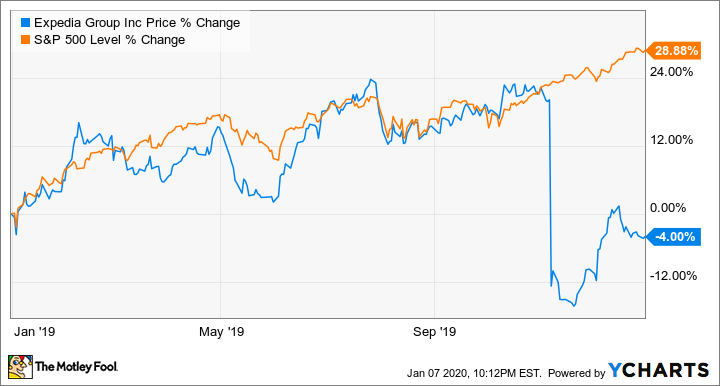What happened
In a bad year for travel stocks, Expedia (NASDAQ:EXPE) did not escape the headwinds in the industry, which include the rise of Google as a major player in travel bookings, Brexit fears, and slowing growth due to market saturation.
Expedia shares finished 2019 down 4%, which is only a slight decline, but significantly below the S&P 500, which returned 29% last year. The chart below show how the two investments diverged.
EXPE data by YCharts.
As you can see, Expedia tracked near the S&P 500 for much of the year, but fell off a cliff after it badly missed earnings estimates in its third-quarter report, the seasonally busiest time of the year.

Image source: Getty Images.
So what
Expedia shares plunged 27.4% on Nov. 7 as the company blamed issues with search engine optimization (SEO) for a weak quarterly performance, saying that traffic had shifted to higher-cost marketing channels with Google making a bigger play for hotel bookings. In addition to its namesake site, Expedia also owns Orbitz, Travelocity, Hotels.com, Hotwire, VRBO, HomeAway, and several other online travel agencies, giving the company diversified exposure to the online travel industry.
Overall revenue in the quarter rose 9% to $3.56 billion, but the main problem was that adjusted earnings per share declined 7% to $3.38, well below estimates at $3.80. Expedia’s report also came at the same time as weak results from Trivago and TripAdvisor, showing that the threat from Google extends to the broader industry. Management lowered its guidance for adjusted EBITDA growth to 5% to 8%, though it also said that it was realigning teams to improve operational efficiency.
Now what
Expedia shares did recover some of those losses over the remainder of the year, and the stock looks reasonably priced at a P/E of less than 20. But Google is a formidable foe in search-related businesses, so Expedia and its investors may have to readjust their growth expectations.
